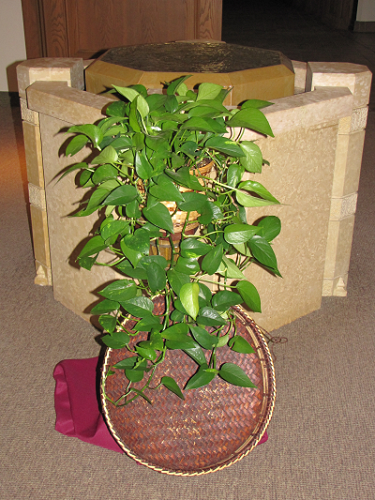
Matthew’s Gospel presents the person of John the Baptist for our contemplation – a man rough-looking and harsh-speaking but with a power that draws others to see what kind of prophet this might be. “Prepare the way of the Lord” he thunders, with a look that pierces to the heart anyone who thinks they are on the right path to holiness of life.
Even Pharisees and Sadducees are drawn to hear his message despite the strong words he uses: “brood of vipers”, “ax at the root of the trees”, “cut down,” “burn with unquenchable fire.”
These are words I don’t want to hear, and I feel a definite urge to turn back the page to consider the more idyllic and hopeful images in the reading from Isaiah…about the leopard lying down with the kid, the lion grazing with the calf… and how a little child will lead them. But Paul tells us all “is written for our instruction,” and so I look deeper.
John’s cry from his heart is asking for a “life-altering” response from his hearers and in his words I see three themes.
- About developing a right relationship with God and with one another … not presuming being children of Abraham, practicing Christians, or members of religious life are enough to save us.
- About a deeper conversion … repent that you may bear good fruit.
- About allowing God to separate the chaff from the wheat in our lives … that we may be the good grain which matures into holiness of life.
And how are we to live this right relationship? Certainly, in this call to develop a deeper relationship with God and one another, there is a message to take more time for quiet reflection on the Word. But what else is being asked? The second reading from Paul’s letter to the Romans gives us a hint when he suggests we need to “welcome one another,” to “think in harmony with one another” that “with one voice we may glorify God.” It sounds very Benedictine, doesn’t it? This certainly is one of the passages that inspired Benedict’s Rule.
And how are we to “think in harmony with one another”? I don’t believe it means never disagreeing with one another. There are times and places for differing points of view that need to be welcomed. It does not mean never voicing an opinion in order to keep the peace. There is surely no inner harmony if we hold back our thoughts and then wonder why some alternative was not considered. And there is a deeper meaning still that needs to be pondered. Paul asks that “the God of endurance and encouragement grant you to think in harmony with one another.” So I ask: What is the God of endurance and encouragement asking of us, in terms of right relationships as we continue our Advent journey with one another? What is it that we need to endure, to face with one another… and how should we encourage one another that we may be in harmony in our thinking? I don’t have answers… this is something we will need to discover for ourselves and as a community.
Second, John the Baptist’s message is penetratingly clear that repentance is necessary for bearing good fruit, and that the ax is already laid at the root of the trees that do not bear good fruit. Bearing good fruit as I learned from my Dad, requires pruning away the excess so that the bud, blossom, and then a beautiful, healthy fruit can form.
In our spiritual analogy, it means pruning away what prevents, and nurturing what promotes healthy spiritual growth. It does mean pondering the word, letting it soak in like the rain and the snow… but it also means acknowledging our sinfulness, our brokenness … the things we do that we wish we had not done. It means recognizing and being at peace with the fact that we are not perfect. But also responding to the Spirit’s prompting to take the next step toward deeper conversion in our spiritual journey whatever it is that is being asked of us.
Perhaps it means, as the message of Nelson Mandela’s life teaches us, being ready to forgive and to be reconciled even in the face of the greatest wrongs done to us. And so I ask…What is it that we need to forgive in ourselves, in our community, in our Church and in our world?

Finally, the message of the Baptist is about separating wheat from chaff in our lives, that we may be the good grain which matures into holiness of life.
In Matthew’s gospel he refers to a winnowing fan, but in my mind I picture the winnowing baskets the Sisters use in Africa to separate wheat from chaff and corn from husk.
See photo on left.
In my meditation I picture the Lord lifting the basket of our lives… to separate out the wheat from chaff. Sometimes that lifting and dropping down can be a bumpier ride than at other times. Sometimes that wind blowing might be a gentle breeze and at other times more like a gale… but it is the Lord who sifts that the chaff may be blown away by the Spirit.
And so I ask myself and all of us what in our lives needs to be sorted out, sifted through, saved, stored up, cherished? What do I, what do we need to let go of, so that the Spirit’s breath can blow it away?
In summary, the message for the second Sunday of Advent is about right relationships with God and one another, about repentance that we might bear good fruit and about separating the wheat from the chaff in our lives. It means seriously looking at what needs to be changed that we might live in better harmony within ourselves and with one another, at what needs to change in ourselves that the world may be a better place… not that we become saints all at once but by taking the next step whatever the spirit is calling us to do and to be at this time.
And I pray that as we move through this cold, wintery season, we may also move closer to the fire … the fire which is Christ the light of the world.
